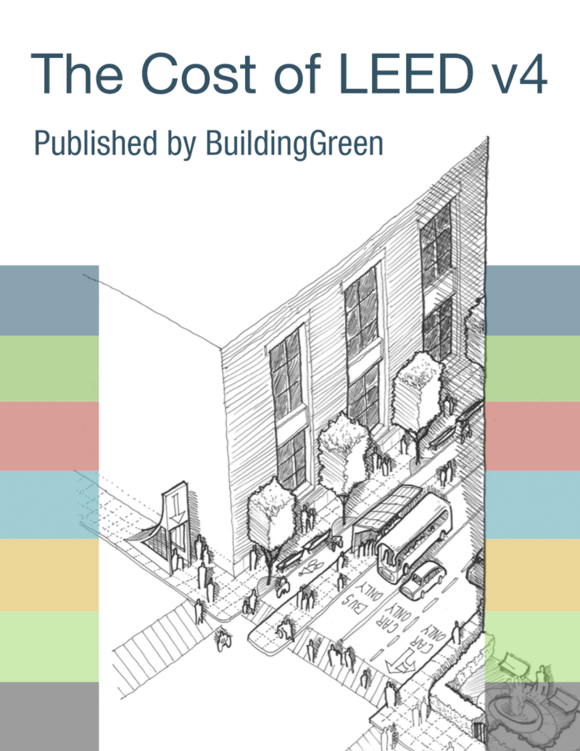View the LEED v4 version of this credit »
Credit achievement rate
XX%
Upgrade to LEEDuser Premium to see how many projects achieved this credit. Try it free »
LEEDuser’s viewpoint
Frank advice from LEED experts
LEED is changing all the time, and every project is unique. Even seasoned professionals can miss a critical detail and lose a credit or even a prerequisite at the last minute. Our expert advice guides our LEEDuser Premium members and saves you valuable time.
Credit language

© Copyright U.S. Green Building Council, Inc. All rights reserved.
Requirements
Reduce outdoor water use through one of the following options. Nonvegetated surfaces, such as permeable or impermeable pavement, should be excluded from landscape area calculations. Athletic fields and playgrounds (if vegetated) and food gardens may be included or excluded at the project team’s discretion.
Option 1. No Irrigation Required (2 points except Healthcare and CS, 1 point Healthcare, 3 points CS)
Show that the landscape does not require a permanent irrigation system beyond a maximum two-year establishment period. OROption 2. Reduced Irrigation (1-2 points except Healthcare and CS, 1 point Healthcare, 3 points CS)
Reduce the project’s landscape water requirement (LWR) by at least 50% from the calculated baseline for the site’s peak watering month. Reductions must first be achieved through plant species selection and irrigation system efficiency as calculated in the Environmental Protection Agency (EPA) WaterSense Water Budget Tool. Additional reductions beyond 30% may be achieved using any combination of efficiency, alternative water sources, and smart scheduling technologies.| Percentage reduction from baseline | Points (except Healthcare) | Points (Healthcare) | Points (CS) |
|---|---|---|---|
| 50% | 1 | 1 | 1 |
| 75% | -- | -- | 2 |
| 100% | 2 | — | 3 |
What does it cost?
Cost estimates for this credit
On each BD+C v4 credit, LEEDuser offers the wisdom of a team of architects, engineers, cost estimators, and LEED experts with hundreds of LEED projects between then. They analyzed the sustainable design strategies associated with each LEED credit, but also to assign actual costs to those strategies.
Our tab contains overall cost guidance, notes on what “soft costs” to expect, and a strategy-by-strategy breakdown of what to consider and what it might cost, in percentage premiums, actual costs, or both.
This information is also available in a full PDF download in The Cost of LEED v4 report.
Learn more about The Cost of LEED v4 »Frequently asked questions
See all forum discussions about this credit »Addenda
Documentation toolkit
The motherlode of cheat sheets
LEEDuser’s Documentation Toolkit is loaded with calculators to help assess credit compliance, tracking spreadsheets for materials, sample templates to help guide your narratives and LEED Online submissions, and examples of actual submissions from certified LEED projects for you to check your work against. To get your plaque, start with the right toolkit.
Get the inside scoop
Our editors have written a detailed analysis of nearly every LEED credit, and LEEDuser premium members get full access. We’ll tell you whether the credit is easy to accomplish or better left alone, and we provide insider tips on how to document it successfully.

© Copyright U.S. Green Building Council, Inc. All rights reserved.
Requirements
Reduce outdoor water use through one of the following options. Nonvegetated surfaces, such as permeable or impermeable pavement, should be excluded from landscape area calculations. Athletic fields and playgrounds (if vegetated) and food gardens may be included or excluded at the project team’s discretion.
Option 1. No Irrigation Required (2 points except Healthcare and CS, 1 point Healthcare, 3 points CS)
Show that the landscape does not require a permanent irrigation system beyond a maximum two-year establishment period. OROption 2. Reduced Irrigation (1-2 points except Healthcare and CS, 1 point Healthcare, 3 points CS)
Reduce the project’s landscape water requirement (LWR) by at least 50% from the calculated baseline for the site’s peak watering month. Reductions must first be achieved through plant species selection and irrigation system efficiency as calculated in the Environmental Protection Agency (EPA) WaterSense Water Budget Tool. Additional reductions beyond 30% may be achieved using any combination of efficiency, alternative water sources, and smart scheduling technologies.| Percentage reduction from baseline | Points (except Healthcare) | Points (Healthcare) | Points (CS) |
|---|---|---|---|
| 50% | 1 | 1 | 1 |
| 75% | -- | -- | 2 |
| 100% | 2 | — | 3 |
XX%
Upgrade to LEEDuser Premium to see how many projects achieved this credit. Try it free »


